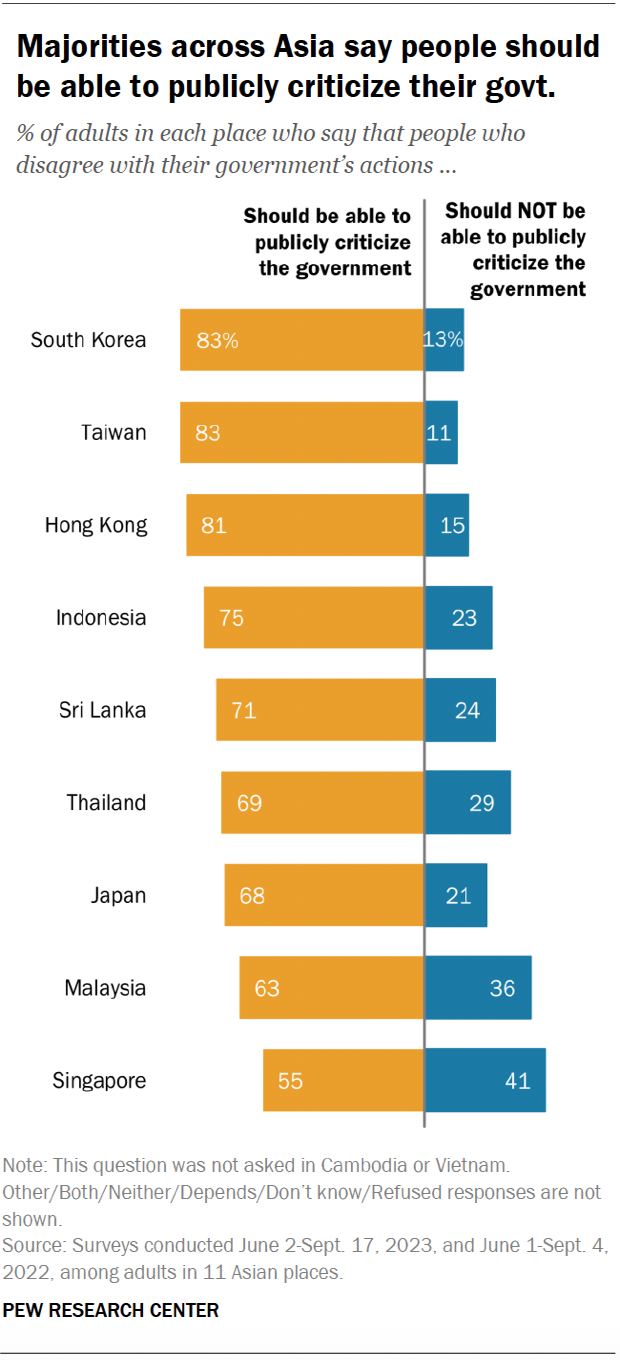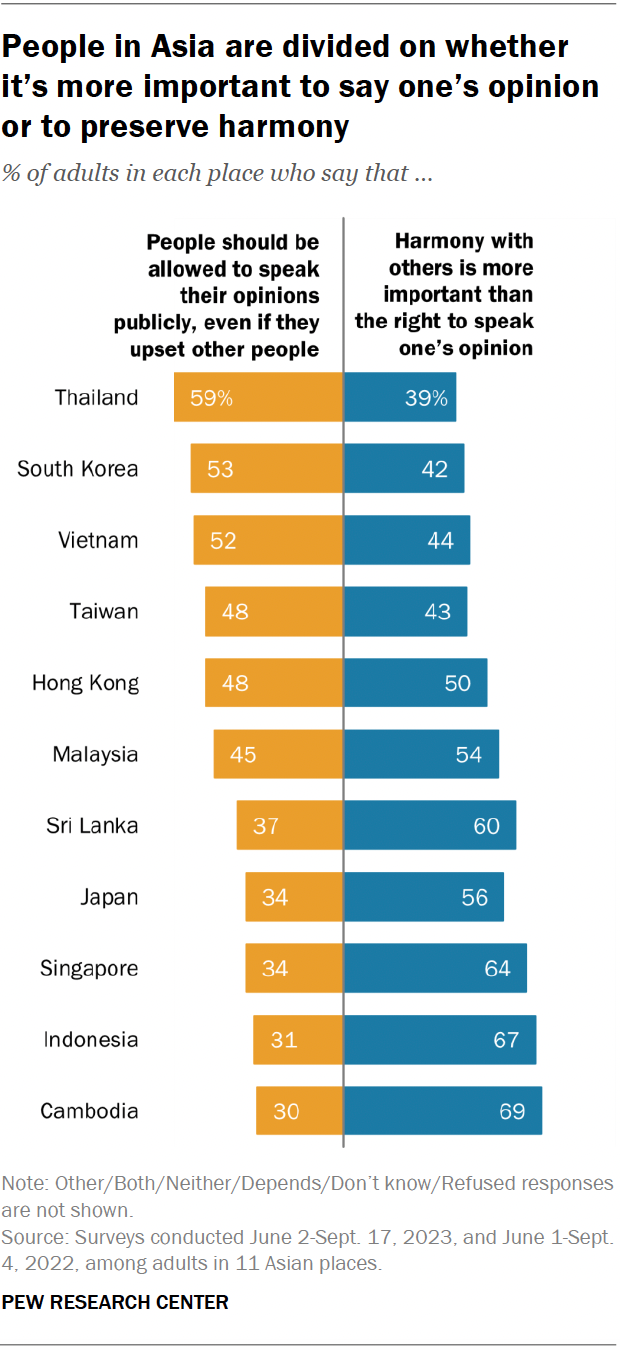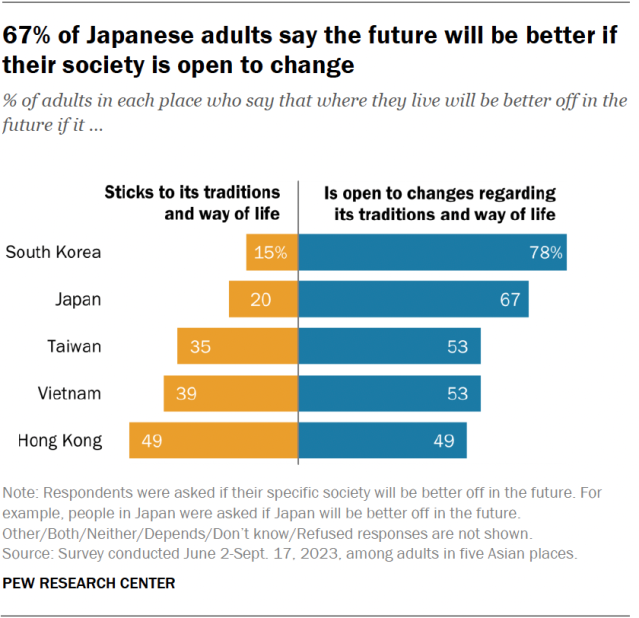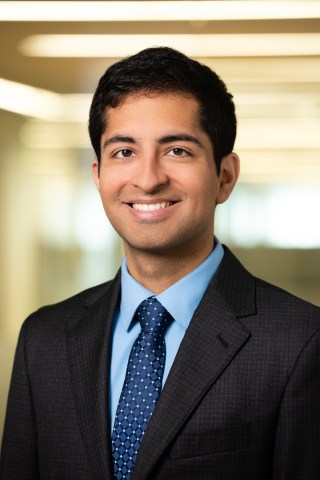
In Hong Kong, Japan, South Korea and Taiwan, large majorities of adults say that people who disagree with their government’s actions should be able to publicly criticize the government, according to a 2023 Pew Research Center survey. For instance, 83% in both South Korea and Taiwan say this.
Pew Research Center conducted this analysis to explore how adults across Asia view government criticism and free speech.
Data comes from two Pew Research Center projects. Data for Hong Kong, Japan, South Korea, Taiwan and Vietnam comes from a Center survey of 10,390 adults conducted from June to September 2023. Data for Cambodia, Indonesia, Malaysia, Singapore, Sri Lanka and Thailand comes from a Center survey of 13,122 adults conducted from June to September 2022.
Interviews were conducted over the phone in six places: Hong Kong, Japan, Malaysia, Singapore, South Korea and Taiwan. In Cambodia, Indonesia, Sri Lanka, Thailand and Vietnam, interviews took place face-to-face.
These surveys are part of the Pew-Templeton Global Religious Futures project, which analyzes religious change and its impact on societies around the world.
Respondents were selected using a probability-based sample design. Data was weighted to account for different probabilities of selection and to align with demographic benchmarks for the adult populations.
For more information, read the 2023 survey’s full list of questions and responses, the 2022 survey’s full list of questions and responses, and our survey methodology.

And in Hong Kong – where recent laws have curtailed free speech and dissent – 81% of adults say people should be able to criticize the government in public.
Adults in these East Asian places are generally more supportive of critical speech than those in the South and Southeast Asian societies we surveyed in 2022. Those societies included Indonesia, Malaysia, Singapore, Sri Lanka and Thailand. Like in East Asia, some of these places have legal restrictions on free speech.
Still, majorities in South and Southeast Asia say that people should be able to publicly criticize the government, including three-quarters of Indonesians. In Singapore, where freedom of expression and freedom of the press are limited, 55% say this.
(Cambodia and Vietnam were also included in these surveys, but we did not ask this question in those places.)
Free speech or social harmony?

While most adults in the places surveyed support the right to publicly criticize the government, there is no consensus on how free speech should intersect with social harmony.
We asked whether people should be allowed to publicly speak their opinions, even if they upset other people, or whether harmony with others is more important than the right to speak one’s opinion.
Clear majorities in several places, including Cambodia (69%) and Indonesia (67%), say harmony is more important than the right to speak your opinion. However, a majority of Thai adults (59%) hold the opposite view.
Adults in Hong Kong and Taiwan are fairly evenly split on this question.
Differences by age and education
In most of the surveyed places, adults ages 18 to 34 and those with more education are more likely than their counterparts to support the right to criticize the government. They are also more likely to support speaking freely, even at the expense of social harmony.
For instance, in South Korea, 92% of adults under 35 say people should be free to criticize the government, compared with 80% of those ages 35 and older. And 91% of South Koreans with a postsecondary degree support this, compared with 76% of adults with less education.
Should societies be open to change?

Throughout East Asia and neighboring Vietnam, many people think their society will be better off in the future if it is open to change, as opposed to sticking to its traditions and way of life. In these places, aging populations are raising questions about the future. (We did not ask this question in South and Southeast Asia in 2022.)
Most South Korean (78%) and Japanese (67%) adults say their societies will be better off if they are open to changes. In Taiwan and Vietnam, 53% agree.
People in Hong Kong are evenly split: 49% say Hong Kong will be better off sticking to its traditions, and the same share say it should be open to change.
Across the surveyed places, adults ages 18 to 34 are more likely than those ages 35 and older to support changing traditions. In Vietnam, for example, 61% of younger adults say this, compared with 48% of older adults.
Respondents with more education are also generally more likely than those with less education to say the future will be better if their society is open to change.
Note: For more information, read the 2023 survey’s full list of questions and responses, the 2022 survey’s full list of questions and responses, and our survey methodology.
